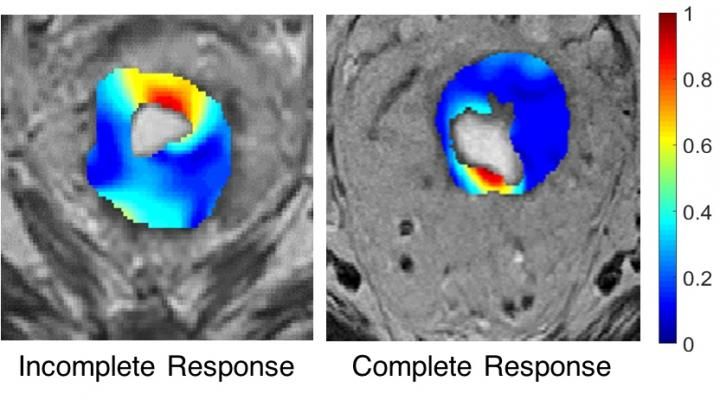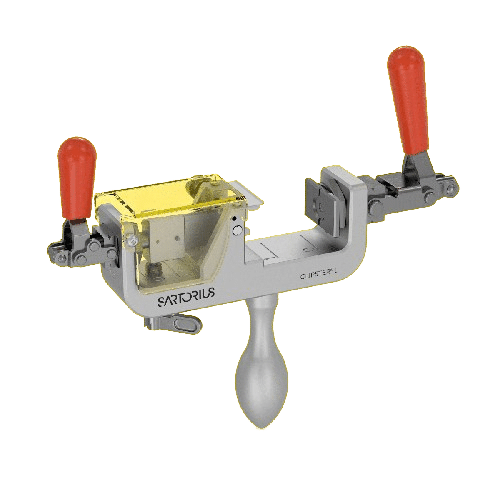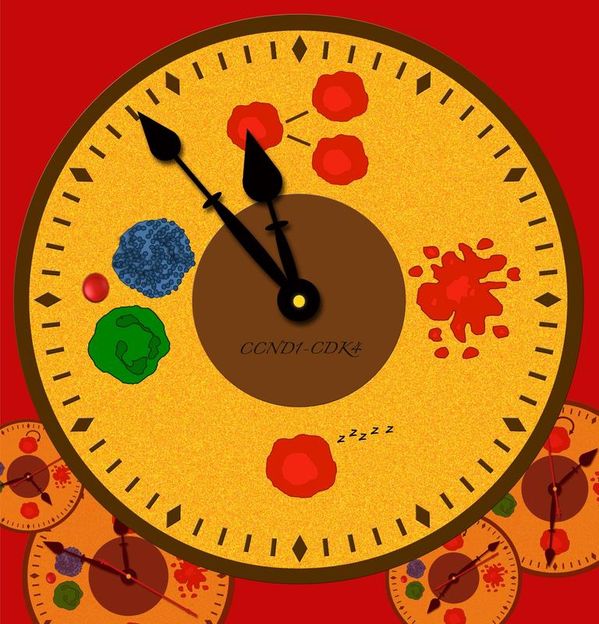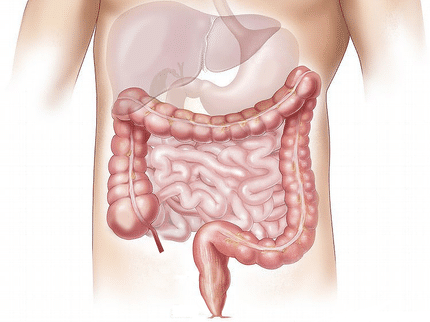Researchers developing GPS for rectal cancer surgery
Researchers estimate that up to 10,000 rectal cancer patients undergo unnecessary surgery, and more than 25,000 suffer from pelvic sepsis, wound infection and permanent impairments from aggressive surgery in the United States annually.

The post-chemoradiation image of rectal cancer on the left shows residual cancer that requires surgery. The image on the right shows no signs of residual cancer.
Case Western Reserve University
That's because it's difficult to reliably tell which patients treated with chemotherapy and radiation still need surgery. Another challenge is surgeons lack strong guidance on just how much tissue beyond the cancerous tumor they should remove.
A researcher at Case Western Reserve University aims to provide answers to both uncertainties by analyzing features found in magnetic resonance images regularly taken before surgery and pathological specimens removed during surgery.
The features are too small to be seen by the human eye, but can be measured with computers. When associated with the known outcomes of past patients, the features may be used to make risk assessments and surgical maps for new patients.
"Because we have access to the images and the pathology, we can create accurate maps of residual disease," said Satish Viswanath, research assistant professor in biomedical engineering and member of the Center for Computational Imaging and Personalized Diagnostics (CCIPD) at Case Western Reserve. "These analytics can be used as a guide for the surgical margins--a GPS for surgeons."
Viswanath has received a $569,000, three-year grant from the Department of Defense to fund the project.
While obviously not limited to those who serve in the military, colorectal cancer is the third most common cancer among veterans and active duty military personnel.
Although studies show less invasive laparoscopic surgery yields more benefit, more than 90 percent undergo radical surgery due largely to the lack of reliable guidance. Still, 5 percent to 10 percent suffer local recurrence, a significant cause of death among older veterans.
By mining the images and data, Viswanath and co-investigators aim to learn which features, such as textures associated with lesions or fibrosis, are associated with residual disease.
The researchers will co-register, or align and fuse, the post-chemoradiation MR images with post-surgery pathology images. They will then try to determine which features on MRI are associated with patients' outcomes--whether the cancer returned, they suffered incontinence or other impairments, or they beat the disease with little collateral damage with or without surgery.
Researchers will develop a risk-assessment scoring system based on those associations. The score will help doctors determine which patients need surgery after chemotherapy and radiation treatments and which don't.
For those who need surgery, the associations will be used to define the boundaries. The goal is to remove enough tissue to prevent recurrence of cancer, but no more. Researchers believe that will reduce metastasis and also the number of impairments caused by overly aggressive surgery.
The researchers will use post-chemoradiation images and pathology specimens from University Hospitals Case Medical Center to develop the surgical GPS and risk scores. They will validate the tools using images and pathology outcomes and assessments from the Stokes Cleveland VA.
Organizations
Other news from the department science

Get the life science industry in your inbox
By submitting this form you agree that LUMITOS AG will send you the newsletter(s) selected above by email. Your data will not be passed on to third parties. Your data will be stored and processed in accordance with our data protection regulations. LUMITOS may contact you by email for the purpose of advertising or market and opinion surveys. You can revoke your consent at any time without giving reasons to LUMITOS AG, Ernst-Augustin-Str. 2, 12489 Berlin, Germany or by e-mail at revoke@lumitos.com with effect for the future. In addition, each email contains a link to unsubscribe from the corresponding newsletter.
Most read news
More news from our other portals
Last viewed contents
Parasite plants rob genes from their hosts
Ligand Acquires Ab Initio Biotherapeutics, an Antigen-Discovery Company
Biosignal: Collaboration with international company on agriculture applications - Evaluation for use in crop protection to be conducted over 9 months
Morphochem and Probiodrug collaborate in research and development of novel innovative dipeptidyl peptidase IV - DP IV inhibitors for the treatment of Anxiety and Depression
Study Finds Ample Opportunities for Life Science Suppliers in the Biodefense Market

Clipster® Hand Held Tool for Size L | Sterile disconnectors | Sartorius
Merck Becomes the First to Use Acoustic Technology for Cell Therapy Manufacturing - Acquisition of FloDesign Sonics marks next step in autologous manufacturing
Dynavax Issued Landmark Patent Covering Second-Generation TLR9 Agonists
Lion_(company)























































